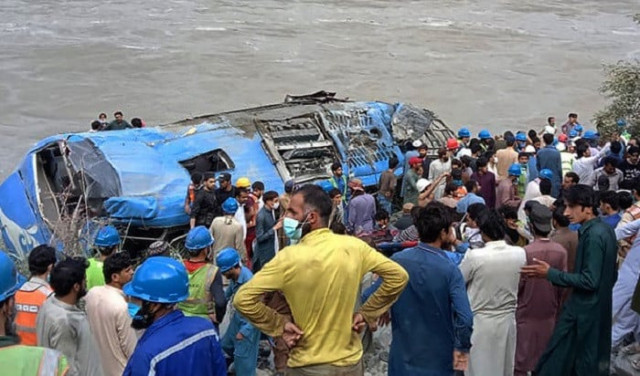In the rugged terrain of Khyber Pakhtunkhwa (K-P), yet another tragic incident unfolded as terrorists targeted engineers enroute to their camp in Dasu. This chilling attack marks the second such event in recent times, echoing the harrowing memories of past assaults on Chinese personnel in various regions, including upper Kohistan and Gwadar. These relentless acts of violence, whether through direct assaults or bombings like the one at the Confucius Centre in Karachi University, underscore a disturbing reality: Pakistan is under siege by home-grown extremists, fuelled by foreign agendas, aiming to plunge the nation into chaos.
To tackle this pressing issue, Pakistan must adopt a comprehensive policy approach beyond conventional military responses. While forceful tactics have their place, they are insufficient to dismantle the entrenched terrorist networks within the country. It's crucial to recognise that resorting to violence, often viewed as a quick solution to political and regional complexities, only perpetuates instability and fosters resentment.
One significant aspect of the struggle against terrorism is preventing the infiltration of malicious actors from neighbouring countries. Pakistan must strengthen its border security to halt the influx of external threats while dismantling sleeper cells linked to groups like the Tehreek-e-Taliban Pakistan (TTP) and other insurgents. However, brute force alone cannot achieve this goal.
A paradigm shift is needed in Pakistan's counterterrorism strategy, one that embraces modern tactics and prioritises intelligence gathering, community engagement, and international cooperation. Embracing technology and innovation will enhance the effectiveness of counterterrorism operations, enabling security forces to stay ahead of evolving threats. Moreover, fostering stronger partnerships with foreign allies and developers can provide invaluable support in training, intelligence sharing, and capacity building.
Yet, combating terrorism extends beyond security measures. It demands societal commitment to eradicating extremism and addressing underlying grievances that fuel radicalisation. This entails efforts to expose and isolate individuals and groups perpetrating violence, along with their supporters. Social repercussions, such as ostracism, should be utilised to discredit extremist ideologies and disrupt their networks.
Furthermore, there is a critical need for investment in education and socio-economic development in vulnerable communities. By providing opportunities for employment, education, and social integration, Pakistan can undermine the appeal of extremist ideologies and empower individuals to reject violence.
In confronting the scourge of home-grown terrorism, Pakistan stands at a critical juncture. It must seize this moment to revitalise its approach, drawing upon lessons learned and embracing innovative solutions. The path ahead is fraught with challenges, but with a concerted effort and unwavering resolve, Pakistan can overcome this menace and pave the way for a more secure and prosperous future for its citizens. It's time to prioritise policy over posturing and cooperation over confrontation in the fight against terrorism.



COMMENTS
Comments are moderated and generally will be posted if they are on-topic and not abusive.
For more information, please see our Comments FAQ